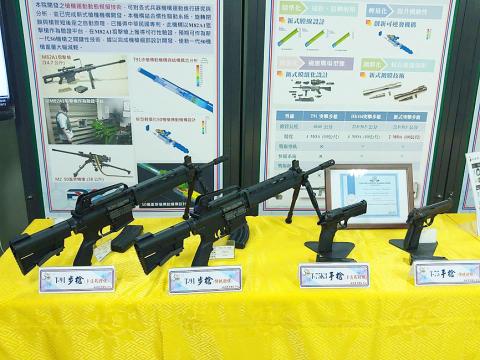New handguns and assault rifles for the armed forces are benefiting from National Defense University’s proprietary technology, a polygonal rifling that doubles the service life of barrels and more than doubles their precision, the university said.
Employed in the military’s new T75K3 pistols, polygonal rifling would also be used in the T91K3 assault rifle, which is being developed at the Armaments Bureau’s 205th Arsenal, the university said.
Rifling — a groove that spirals down the inside of a barrel — gives a bullet spin, thereby improving its aerodynamic stability and making the gun more precise at longer ranges, power vehicles and systems engineering professor Deng Shi-gan (鄧世剛) said.

Photo: Aaron Tu, Taipei Times
The inside of a barrel with conventional rifling is marked with sharp, angular indentations that cause friction and allow gas to escape, he said.
The smooth undulating grooves of polygonal rifling — the name comes from the shape of the bore, which resembles a polygon with rounded corners — gives superior wear-and-tear and gas-sealing properties, he added.
The university team used computer-aided design to make the rifling patterns to greatly extend the barrel’s service life and improve precision, Deng said, adding that the program was partially funded by the National Defense Industrial Development Foundation.
Firing the barrel at 100m would result in an average 10-shot grouping about the size of a NT$10 coin, while the barrels can be used to fire more than 20,000 bullets without any loss of accuracy, material sciences professor Liu Yi-ming (劉益銘) said.
The university and the arsenal are also jointly developing a nickel-boron finish for bolt carriers that should almost eliminate the need for rifle lubricant, Chungshan Institute of Science and Technology Commandant Major General Jing Yuan-yeu (荊元宇) said.
Compared with phosphate, nickel-boron finishes last longer and offer greater resistance to corrosion, increasing the number of rounds between malfunctions and are less harmful to the environment, Jing said.
In testing, a T91 rifle with the nickel-boron finish and no additional lubricant could fire about 10,500 rounds before jamming, he said, adding that there was no discernible damage at 8,000 rounds and the corrosion tests were promising.
The finish would make the next generation of small arms more reliable and durable, while decreasing upkeep requirements, he said.
In other news, a defense official said that the army plans to buy 10,404 T75K3 pistols at a cost of NT$368.6 million (US$12 million) to completely replace the aging Colt M1911A1 handguns in its inventory.
The M1911A1 pistols, either 60-year-old holdouts from US military aid or locally produced copies, show significant wear-and-tear, the official said on condition of anonymity.
The M1911A1 is considered an overly heavy weapon with excessive recoil and a small magazine — only seven rounds — compared with the T75K3, which has a more durable barrel and a 15-round magazine, the official said.
All of the aging pistols should be replaced by 2022, the official said.

A preclearance service to facilitate entry for people traveling to select airports in Japan would be available from Thursday next week to Feb. 25 at Taiwan Taoyuan International Airport, Taoyuan International Airport Corp (TIAC) said on Tuesday. The service was first made available to Taiwanese travelers throughout the winter vacation of 2024 and during the Lunar New Year holiday. In addition to flights to the Japanese cities of Hakodate, Asahikawa, Akita, Sendai, Niigata, Okayama, Takamatsu, Kumamoto and Kagoshima, the service would be available to travelers to Kobe and Oita. The service can be accessed by passengers of 15 flight routes operated by

GIVE AND TAKE: Blood demand continues to rise each year, while fewer young donors are available due to the nation’s falling birthrate, a doctor said Blood donors can redeem points earned from donations to obtain limited edition Formosan black bear travel mugs, the Kaohsiung Blood Center said yesterday, as it announced a goal of stocking 20,000 units of blood prior to the Lunar New Year. The last month of the lunar year is National Blood Donation Month, when local centers seek to stockpile blood for use during the Lunar New Year holiday. The blood demand in southern Taiwan — including Tainan and Kaohsiung, as well as Chiayi, Pingtung, Penghu and Taitung counties — is about 2,000 units per day, the center said. The donation campaign aims to boost

ENHANCING EFFICIENCY: The apron can accommodate 16 airplanes overnight at Taoyuan airport while work on the third runway continues, the transport minister said A new temporary overnight parking apron at Taiwan Taoyuan International Airport is to start operating on Friday next week to boost operational efficiency while the third runway is being constructed, the Ministry of Transportation and Communications said yesterday. The apron — one of the crucial projects in the construction of the third runway — can accommodate 16 aircraft overnight at the nation’s largest international airport, Minister of Transportation and Communications Chen Shih-kai (陳世凱) told reporters while inspecting the new facility yesterday morning. Aside from providing the airport operator with greater flexibility in aircraft parking during the third runway construction,

American climber Alex Honnold is to attempt a free climb of Taipei 101 today at 9am, with traffic closures around the skyscraper. To accommodate the climb attempt and filming, the Taipei Department of Transportation said traffic controls would be enforced around the Taipei 101 area. If weather conditions delay the climb, the restrictions would be pushed back to tomorrow. Traffic controls would be in place today from 7am to 11am around the Taipei 101 area, the department said. Songzhi Road would be fully closed in both directions between Songlian Road and Xinyi Road Sec 5, it said, adding that bidirectional traffic controls would